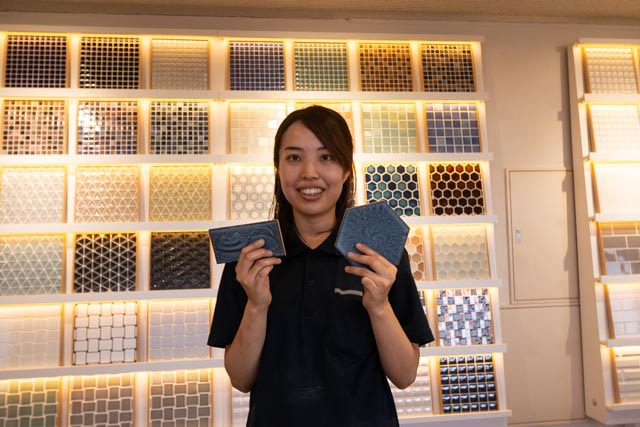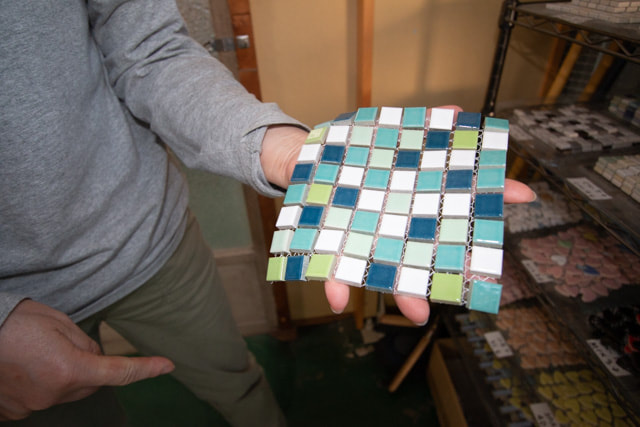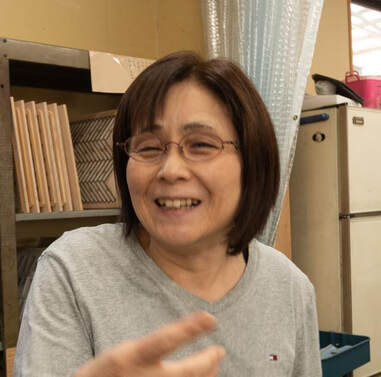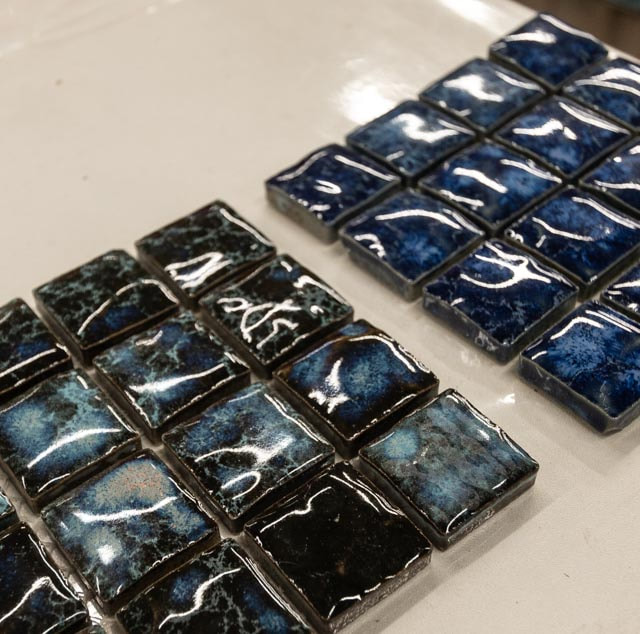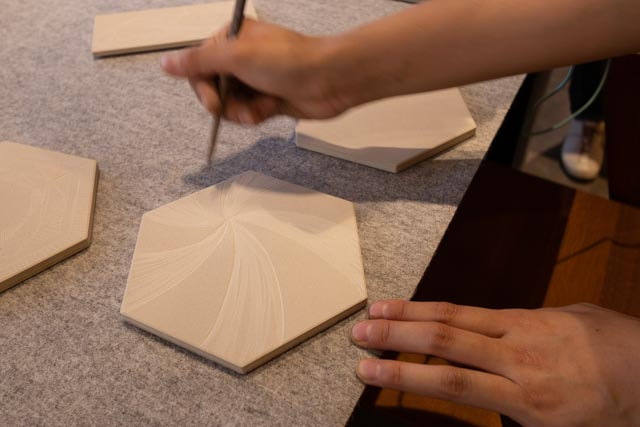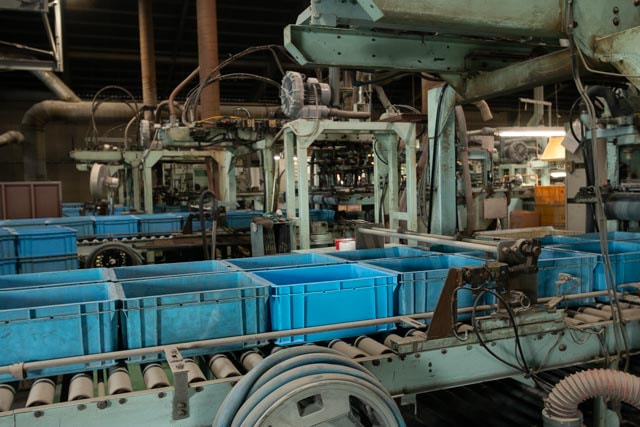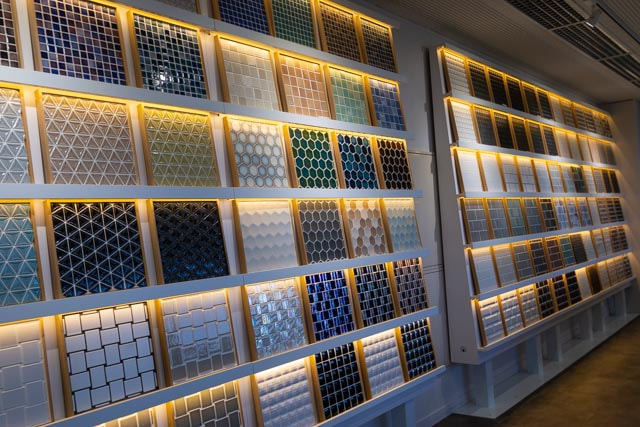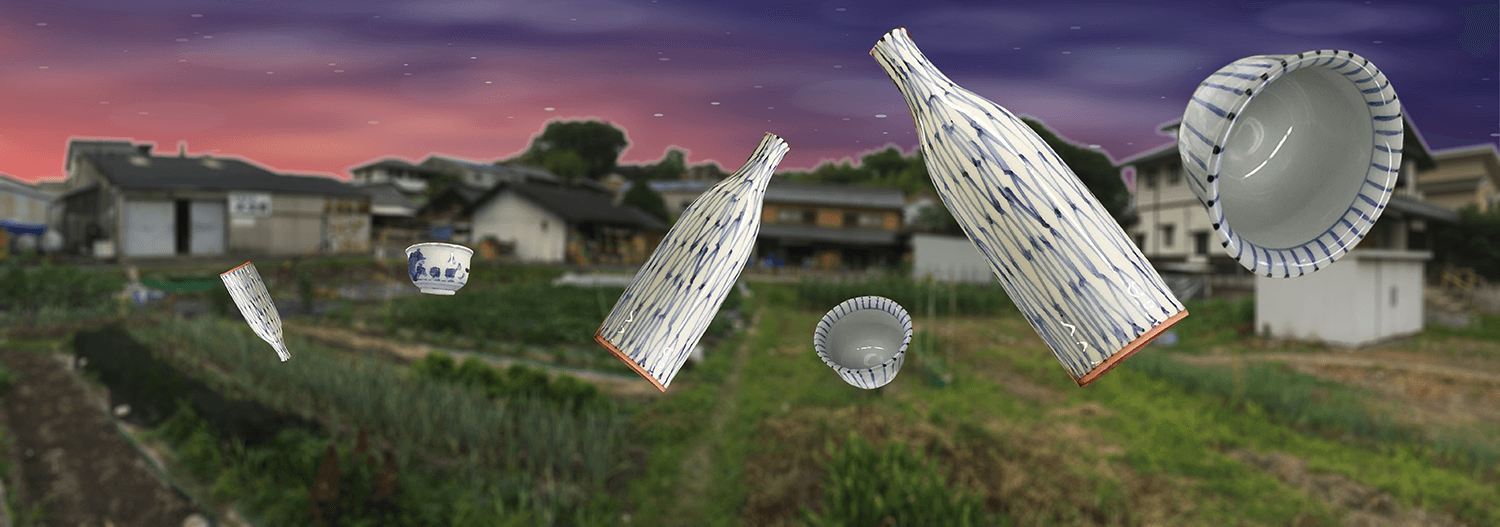2019 English Guided Tours
feature experience: THE world of tiles
About the programs
Tajimirukomichi is a new program in which people living in Tajimi will become your "guiding partners". The program is about providing unique experiences only possible in this city, and runs from October 10 (Thur) to December 22 (Sun). In this article, we introduce two of the experiences available in The World of Tiles Tour, which includes two factory visits and workshops as well as a visit to the Mosaic Tiles Museum in Kasahara. The event is held on October 23, 2019.
Tiles connect the ancient to the present
It was a sweltering day in September when we tried the new tiles tour in Kasahara town. It includes two factory visits and concludes with a tour of the famous Mosaic Tiles Museum. While the museum provides an enjoyable and visually appealing experience, moving around the actual manufacturing spaces adds a whole new dimension to the world of tiles. Pottery - an ancient tradition in this area - excites people of all generations. Tiles tend to have a less romantic image, but few materials inspire creativity to the same extent. "One of the oldest forms of decorative arts," writes Eric Baldwin in The Architizer, "tiles date as far back as the Egyptians, who decorated their houses with blue tile bricks, as well as the Mesopotamians, who used glazed bricks. [...] Today, tiles have expanded to encompass a wide range of materials, applications, patterns and designs."
Perhaps it is this aspect of creativity and a direct connection to our daily life that is most appealing about tiles. As I mentioned in our first article on the subject, Kasahara is historically the virtual Tile Kingdom of Japan. During its heyday, in the bubble economy of the 80s, massive factories churned out tiles for the construction industry, and fortunes were made. A few still remain, as well as some smaller-scale ones. The newly designed tour includes two of the most interesting factories. Our first stop was Maruman Shokai Co., Ltd.
hyperfast mosaic tile craftswomen
the experience
After a quick tour of the room where the mosaics are produced, participants will make a smaller size version. It will be an hour-long experience. They will lay up the mosaic on a piece of mesh the same way as the workers, from start to finish. The mesh sheets of mosaic will then be dried and can be picked up the next day, or posted. The tiles can be mounted in a wooden frame. Participants can make any design, visitors so far have been very creative. It is easy to create intricate patterns and designs since the tiles are so small.
Ms Yukari Furuta, CEO of Maruman Shokai Co., Ltd., received us at her factory with a broad smile and a rapid speech. As it turned out her highly skilled workers - she prefers to call them craftswomen - turned out to be equally quick at their tasks. They fit tiny tiles in frames by hand, combining them into a well-balanced design. The frame is then removed, but the tiles remain set on a mesh ready for installation on a wall, for example. "The customer places an order with us specifying the color balance for the pattern," says Furuta, "but our workers set the pattern differently for each mesh on the fly.
That's why I think of them as craftswomen," she continues. "For example, the customer orders a color combination of 90% green and 10% silver. Our workers will then use that as a rule but lay down the pattern for each mesh differently. They must work fast while creating visually appealing patterns, and at the same time, discard defect tiles." We watch how the women shake the frame to roughly set the tiles in place, then continue to position them at a rapid pace. "The tiles are so small that no machine can handle them," Furuta explains. "That, in addition to the fact that human sensibility is required to create pleasant patterns, makes this work hard to automate."
The competition in the tiles market is fierce. What makes these tiles different? "Simply put, you can say that Japanese tiles are in the middle of the market," says Furuta. They are more expensive but higher quality than those from high-volume producers in China, for example. But they are more affordable and less sophisticated than more luxurious products from countries like Italy. There is still demand for our products abroad - about 50% of our output is exported." This reminds me of the car market: Japanese cars are reliable, high quality but not luxurious. There is a substantial export market for them. It's a different market from extreme, high-prized cars like the Ferrari, on the one hand, and ultra-cheap Chinese or Indian vehicles on the other.
We live in an age of change. Rapid technological development has now made it possible to 3d-print tiles. This opens new possibilities in many ways, but digital production methods also tend to result in more symmetrical, machine-like results. By contrast, there is an element of hand-crafted sophistication that makes Japanese products different.
We live in an age of change. Rapid technological development has now made it possible to 3d-print tiles. This opens new possibilities in many ways, but digital production methods also tend to result in more symmetrical, machine-like results. By contrast, there is an element of hand-crafted sophistication that makes Japanese products different.
"Look at these," says Furuta, firing off another rapid sentence. She brings a couple of meshes mounted with beautiful tiles that remind me of Japanese pottery. Their surfaces are rugged like that of a classic Japanese tea bowl. They reflect light beautifully, each and everyone different from the others. She points to the individual stones on the mesh: "Not one of these is like the others. This is a world of difference to the 3d-printed products that are growing so fast abroad. I have seen how people react to this kind of tiles when they are displayed alongside foreign-made products at trade shows in the US. "'Wait, there is something different about these!', they say. They have such a 'rich' look!'. That is because they are all different".
From handicraft to a world of automation
the experience
After touring a large factory, you will create your own designs by carving a pattern in unglazed, pressed tiles. They will then be glazed and fired at the factory and delivered to the participants. The contrast between the small scale manual work at Maruman Shokai and this hyper-modern facility provides a fascinating perspective of the world of tiles. You will also see how even automated manufacturing can create beautiful products. The whole tour takes two hours.
Our next stop was Sugiura Seito Co., Ltd., a large tiles manufacturer. Ms Mioka Azuma, from the company's sales department, took us on a tour, and it was like a trip to another world. We stepped into a massive factory filled with machinery and products in blue crates. It looked like a scene from Blade Runner, the famous SF film about a dystopian future. But this was a place where lovely things are made, as we would learn later.
We walked around the facility trying to communicate in the noise from the machines. After a few minutes, we had reached the beginning of one of the four production lines. "This is where it all starts," said Azuma. The raw material for the tiles is this powder," and she pointed down into a large container. From then on, we walk around the massive factory while she explained the production process step by step. While our first stop had been a small world of craftswomen working with their hands, here everything was automated. Still, we were all excited to see this. My friend from the UK that has just moved to Tajimi was obviously impressed. He is a VR gamer and designer and seemed to appreciate all the machinery and the whole atmosphere of the place. Indeed, it would work as a world in some game or SF movie! Well, the most exciting part is the experience itself, so I shouldn't ruin it by disclosing all the details beforehand.
After this impressive introduction, we returned to the main office and the company showroom. It is filled with tiles in every shape and form imaginable. The view brought my mind back to Eric Baldwin's statement that while tiles are an ancient form of decorative art, it remains a part of our daily life. The designs were delicate and often stunningly beautiful. Templates for the tiles are spread out over a table for the customer to choose from. They can then choose from a broad spectrum of colors and patterns displayed on another table. This is the place where tour participants will be invited to carve their own designs out of soft tiles, which will later be glazed and hardened.
The last stop: the mosaic tile museum
After these two visits to manufacturers you will be guided at the Mosaic Tile Museum by the curator Ms Murayama. Please read our first article on the tile industry in Kasahara to find more information about the museum.
Reservations and inquiries for this experience (more below)
Tour date: October 23, 2019
Time: 10:00 - 14:30
Venue: Tajimi Mosaic Tile Museum, others.
2082-5 Kasahara-cho, Tajimi-shi, Gifu-ken 507-0901
Price: 500 yen
Participants: Max 10 persons
Reservations: e-mail: [email protected] / tel 0572-43-5101
Inquiries: Tajimi Mosaic Tile Museum
0572-43-5101 (Office hours: 9:00 - 17:00)
Person in charge: Ms Murayama
Closed: Mondays (the following weekday if Monday is a holiday)
[email protected]
Time: 10:00 - 14:30
Venue: Tajimi Mosaic Tile Museum, others.
2082-5 Kasahara-cho, Tajimi-shi, Gifu-ken 507-0901
Price: 500 yen
Participants: Max 10 persons
Reservations: e-mail: [email protected] / tel 0572-43-5101
Inquiries: Tajimi Mosaic Tile Museum
0572-43-5101 (Office hours: 9:00 - 17:00)
Person in charge: Ms Murayama
Closed: Mondays (the following weekday if Monday is a holiday)
[email protected]
Other English guided Tajimi Tours
Please make reservations for English programs directly to the respective program office by email or phone. Inquiries regarding English programs should also be made by email or phone. Please download the pamphlet for details.
tours
Make Your Own Tableware Design
Use ceramic decals to create a uniquely designed piece of tableware. Learn about the whole production process. What you created before noon will be delivered to you the same day.
Date: Every Wednesday during the event period
Time: 10:00 - 12:00
Reservations: e-mail [email protected] / tel 0572-22-3810
Inquiries: Marumo Takagi Toki KK
0572-22-3810 (Office hours: 9:15 - 17:15)
Person in charge: Ms Ishizu
Closed: Saturdays, Sundays, holidays
[email protected]
Download pamphlet
Make a Pottery Candle Holder
After a tour of the Ichinokura Sakazuki Art Museum, design your own candle holder by carving it from a 12 cm long cylindrical piece of clay. Kind and gentle guidance for everyone.
Date: October 10 - December 22
Time: 10:00 - 12:00
Reservations: e-mail [email protected] / tel 0572-22-0509
Inquiries: Kobei-gama Ceramics Studio
0572-22-0509 (Office hours: 10:00 - 17:00)
e-mail: [email protected]
Person in charge: Ms Ito
Download pamphlet
Feel the Vibes - The "Amusement Factory"
A "free curve" gondola. A high-speed potter's wheel. A mammoth 1320°C kiln. 300 types of tableware. Experience the meeting of high volume production and exceptional quality. Bring home a special cup gift!
Date: September 16, October 14, November 4
Time: 09:15 - 11:45
Reservations: e-mail [email protected] / tel 0572-22-8287
Inquiries: Maruasa Porcelain Factory co., ltd.
Person in charge: Yamamoto
0572-22-8287 (Office hours: 9:00 - 16:45)
e-mail: [email protected]
Download pamphlet
Use ceramic decals to create a uniquely designed piece of tableware. Learn about the whole production process. What you created before noon will be delivered to you the same day.
Date: Every Wednesday during the event period
Time: 10:00 - 12:00
Reservations: e-mail [email protected] / tel 0572-22-3810
Inquiries: Marumo Takagi Toki KK
0572-22-3810 (Office hours: 9:15 - 17:15)
Person in charge: Ms Ishizu
Closed: Saturdays, Sundays, holidays
[email protected]
Download pamphlet
Make a Pottery Candle Holder
After a tour of the Ichinokura Sakazuki Art Museum, design your own candle holder by carving it from a 12 cm long cylindrical piece of clay. Kind and gentle guidance for everyone.
Date: October 10 - December 22
Time: 10:00 - 12:00
Reservations: e-mail [email protected] / tel 0572-22-0509
Inquiries: Kobei-gama Ceramics Studio
0572-22-0509 (Office hours: 10:00 - 17:00)
e-mail: [email protected]
Person in charge: Ms Ito
Download pamphlet
Feel the Vibes - The "Amusement Factory"
A "free curve" gondola. A high-speed potter's wheel. A mammoth 1320°C kiln. 300 types of tableware. Experience the meeting of high volume production and exceptional quality. Bring home a special cup gift!
Date: September 16, October 14, November 4
Time: 09:15 - 11:45
Reservations: e-mail [email protected] / tel 0572-22-8287
Inquiries: Maruasa Porcelain Factory co., ltd.
Person in charge: Yamamoto
0572-22-8287 (Office hours: 9:00 - 16:45)
e-mail: [email protected]
Download pamphlet
Japanese guided tours
Over 70 tours and experiences are available with Japanese guidance only. Please register and make all reservations for Japanese tours from our Japanese site.
General program office
Tajimi Tourism Association (Tajimiru-komichi Office)
Tajimi Hinode-cho 2-15/ Ms Muto, Ms Hibino
Email: [email protected]
Tel: 0572-51-8156 (08:30 - 17:00/Closed on Saturdays and Sundays)
Tajimi Tourism Association (Tajimiru-komichi Office)
Tajimi Hinode-cho 2-15/ Ms Muto, Ms Hibino
Email: [email protected]
Tel: 0572-51-8156 (08:30 - 17:00/Closed on Saturdays and Sundays)
